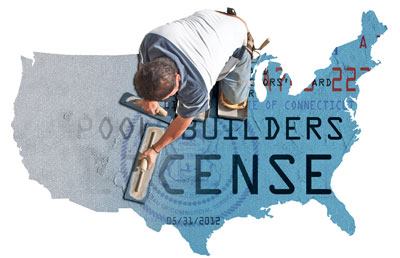Connecticut soon will be added to the number of states requiring a specific license for pool builders.
Senate Bill 863 has passed both houses of the legislature and is awaiting the governor’s signature.
The bill also closes an enforcement loophole in Connecticut’s long-standing service-technician license.
“This is a win-win for everybody, because it’s going to require builders to know what they’re doing — you have to show you’re competent,” said Lawrence Caniglia, executive director of the Northeast Spa & Pool Association.
The licensing law will likely prove one of the strictest in the nation, on par with Florida’s. Although the state’s Department of Consumer Protection hasn’t yet determined the requirements, local trade associations expect the law to closely mirror the existing service-license statute.
That mandate requires that professionals have a certain number of hours of field experience and education, and that they pass a competency test. The law also sets a specific number of hours of continuing education to renew every other year. Grandfathering likely will be allowed for about a year after enactment.
Officials with NESPA expect to see similar laws pass in the remaining three states in its jurisdiction. The group recently recorded another victory when New York’s Nassau County passed a builder-licensing regulation. In that state, these matters are handled county by county, and NESPA officials are next eying Long Island neighbor Suffolk County.
The Connecticut measure also raises the question of whether the rest of the country will follow, and if such requirements are desirable.
Though many states mandate that pool builders receive licenses, several serve as registration more than anything, with the contractor providing proof of insurance, corporate papers and a fee. Other states such as California, Nevada and Arizona do require proof of competency to gain the license, but only at the initial application. After that, licensed builders in those states don’t have to demonstrate updated knowledge or skills.
Connecticut joins Florida in requiring that builders undergo continuing education in order to maintain their licenses. Nevada has approached the Association of Pool & Spa Professionals to discuss lobbying for CE requirements. In that state, however, the economy has put a damper on such ambitions, as government agencies are stretched too thin to accept more enforcement duties.
APSP has considered creating a model licensing code to be used in various states, with guidance on how much education and experience to require, as well as the types of questions that should be on the test. However, that idea hasn’t yet gained traction, partly due to the economy and partly because each state and municipality is different and would have its own needs in such a law, said Jennifer Hatfield, APSP’s director of government affairs.
In Texas, long criticized for a lack of licensing, industry members have discussed pushing for such a standard, but are reconsidering for a different reason. After a service-technician license was instituted in that state, the industry has seen push-back from other trades and testing levels that some consider excessive.
“I think everybody got scared,” said Debra Smith, co-owner of Ft. Worth, Texas-based Pulliam Pools and former president of Texas industry lobbying group APEC.




